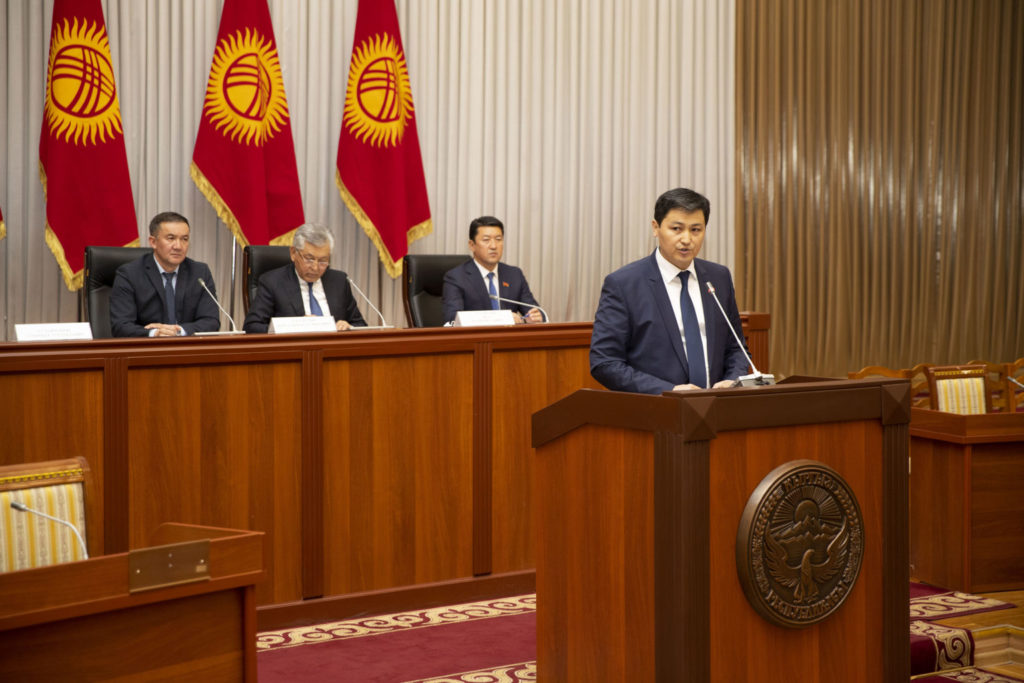Kyrgyzstan’s new prime minister and his government officially took office last week. Ulukbek Maripov could go down in history as the last prime minister of Kyrgyzstan, as President Sadyr Japarov wants to transform the parliamentary system into a presidential one.
This article was originally published on Novastan’s French website on 7 February 2021.
On 3 February, Kyrgyzstan’s president Sadyr Japarov signed a decree appointing Ulukbek Maripov as prime minister. The Kyrgyz parliament had previously approved his candidacy, as well as the structure and composition of his government, by 84 votes to 1. The same day, the new government, composed of only 16 members, was sworn before parliament.
Want more Central Asia in your inbox? Subscribe to our newsletter here.
As Radio Azattyk, the Kyrgyz branch of the American media RFE/RL, notes, the presidential decree is usually signed the day after the vote in parliament and the swearing in takes a few days later. However, in the case of the new Maripov government, all three stages happened on the same day.
The parliament approved Ulukbek Maripov’s candidacy on 1 February, though early signs indicated the interim prime minister Artyom Novikov would get the position. For example, on 29 January, the Kyrgyz news agency 24.kg asserted that Novikov was expected to keep his post. Instead, he became a deputy prime minister in Maripov’s cabinet.
Who is Ulukbek Maripov?
Ulukbek Maripov is relatively unknown to the general public. The 41-year-old has spent much of his career in the shadow of the former deputy prime minister Askarbek Chadiev and of the former president Almazbek Atambayev (2011-2017). According to Radio Azattyk, his political rise began with his appointment as Atambayev’s aide in 2011, before he became, four years later, the then president’s deputy chief of staff. In 2016, he became head of the Accounts Chamber, a state auditing institution, a position he held until his new appointment. However, as 24.kg notes, in February 2020, a dispute with then-president Sooronbay Jeenbekov nearly cost him his position.
Maripov comes from an influential family from the south of the country. His father, Asamidin Maripov, is a former member of parliament. In addition, Maripov’s brother Baktybek Maripov was the head of a district in Osh Region, in southern Kyrgyzstan. On 4 February, he was dismissed by decree in order to avoid a conflict of interest.
Members of parliament from the opposition have raised questions about the role of Maripov’s family in his career. Zarylbek Rysaliev, from the Ata Jurt party, even went so far as to publicly ask whether the prime minister was just a “daddy’s boy”. For the MP Janar Akayev, quoted in the same Azattyk article, the reasons for Maripov’s appointment lie elsewhere: “in a period when the country moves to presidential rule, whoever becomes prime minister will be an assistant to the president. Therefore, Ulukbek Maripov’s candidacy is the most optimal. He has no political ambition, as he says himself.”
The last prime minister of Kyrgyzstan?
Sadyr Japarov does not hide his desire to transform the Kyrgyz parliamentary regime into a presidential system. A majority of voters expressed their approval for this project in a referendum on 10 January 2021, the same day as the presidential election. However, over 60% of eligible voters did not cast a ballot.
Read more: Kyrgyzstan elects Sadyr Japarov and opts for presidential government
The new prime minister thus finds himself in a precarious position. In addition, on 4 February, Japarov expressed his intention to get rid of the position altogether: “the post of prime minister will be abolished, as well as other redundant government positions,” he wrote in a message on the social network Telegram. He also indicated he was planning to put his words into action in the next six months.
A streamlined government
In the meantime, the new prime minister and the president have formed a small government, with only 16 cabinet members. As Radio Azattyk points out, the number of deputy prime ministers has been halved, from four to two. In addition, the number of government ministries, agencies and committees has been drastically reduced, from 48 to 12. As a result, only five ministries remain intact, with all the others subject to restructuring or mergers. For example, the Ministry of the Economy and the Ministry of Finance are now a single entity.
As Eurasianet notes, eight members of the new cabinet were already part of the interim government set up following the events of October 2020, when protests led to the president’s resignation and Japarov’s coming to power. Within the new government, two figures emerge in particular: Kamchybek Tashiev, a long-time ally of Sadyr Japarov, who retains his strategic post at the head of the State Committee for National Security (GKNB in Russian), and Taalaybek Ömüraliev, now minister of defense, a post he had held from 2011 to 2014.
Read more: Kyrgyzstan: President Sooronbay Jeenbekov steps down
The restructuring has the full support of President Sadyr Japarov, who sees it as a tool for efficiency and economic rationalisation. According to Eurasianet, the Kyrgyz president thus claimed that reducing the number of ministries and government agencies would help “stop theft from the treasury”. For example, in a message posted on his Facebook account on 2 February, Japarov assured that the merger of the ministries would save 2 billion som (approximately £18 million) on electricity. The president also said that for a “small” country like Kyrgyzstan, “12 ministries is still too many”.
The opposition is far less enthusiastic. The former prime minister Temir Sariev (2015-2016) considered the restructured cabinet “wrong” and “unnecessary”. Another former prime minister, Felix Kulov, compared it to Russian dolls, arguing that some agencies will not function properly: “You can’t just, automatically, without justification, nest [government institutions] like matryoshka dolls. For example, if the financial police becomes part of the Ministry of Internal Affairs, how will it be managed?”
First steps
Addressing parliament, Ulukbek Maripov declared his government’s priority was the economic crisis due to the Covid-19 pandemic. “The new government will not get involved in politics.Our staff will only work to revive the economy and develop the welfare sector,” he said. On 3 February, the cabinet also met with Sadyr Japarov, who insisted on the need to implement an anti-crisis program as quickly as possible, Katkus.media reports.
On 5 February, the new prime minister also took his first steps on the international stage with a visit to the Digital Forum in Almaty, Kazakhstan. As AKIpress reports, Maripov was able to meet with several of his regional counterparts. This included a brief meeting with the Russian prime minister, Mikhail Mishustin. Russia is also the planned destination of Japarov’s first foreign visit.
Quentin Couvreur
Novastan France
Translated by Valentine Baldassari
For more news and analysis from Central Asia, follow us on Twitter, Facebook, Telegram, Linkedin or Instagram.
 Kyrgyzstan: Ulukbek Maripov heads pared-down government
Kyrgyzstan: Ulukbek Maripov heads pared-down government 



